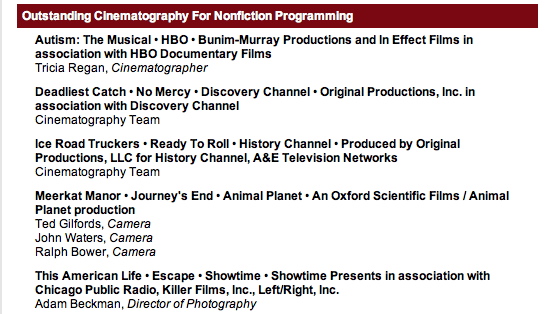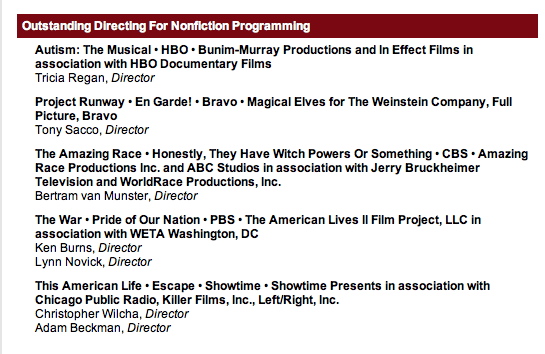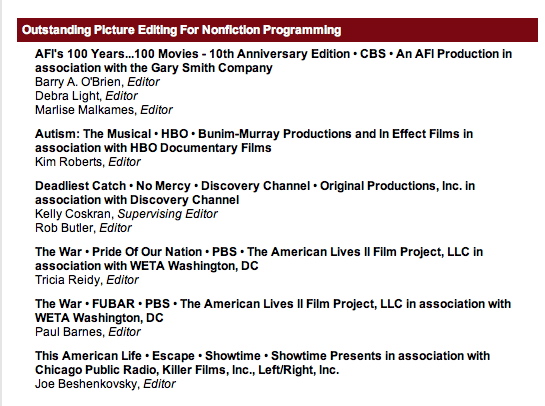Magnolia/A weird memory
So, I watched Magnolia earlier, I really forgot its complete brilliance and beauty. It’s a long movie that doesn’t feel long, basically a series of interconnected stories, themes like, the past repeats itself, mistakes and regrets aren’t unique to the individual. It’s a fast movie in that the cuts between stories are quick, it doesn’t linger on one character’s life for too long. There’s also a lot of camera movement, not shaky Cloverfield camera, just lots of panning, zooming. The cuts and the camera give Magnolia a very fast-paced frenetic feeling, even though its thirty minutes shy of three hours long. It’s also a movie about really fucked up people, people dying physically, emotionally, people whose stories do and don’t work out. I was watching with a friend and she asked, “Are people really like that?” I didn’t feel like putting down the words, I just eyebrowed a “yes.” There’s a scene with Philip Seymour Hoffman, he’s a Hospice nurse trying to track down this dying fellow’s estranged son, trying to fulfill a final request. His son, played by Tom Cruise, turns out to be a pretty famous, pretty vile, motivational speaker, teaching loser guys how to have lots of sex with lots of women. So, Seymour Hoffman’s on the phone talking to one of Cruise’s underlings and says something to the affect, I know this is something like a scene from some movie, but I think movies have scenes like this because this actually happens. I mean, that’s so much of why we go to movies, because we identify with what we see, or we want to do or be what we see. I answered my friend with a “yes” because my experiences have been so much like the characters we were watching. Depression, loneliness, addiction, loss, regret, I know those experiences, felt them, feel them, been drowning in them. Yes, people really are “like that.”
Magnolia’s soundtrack is another reason I love it so much, Aimee Mann contributed most of the songs, specifically written for the movie. One particularly unusual, very moving scene, cuts to each character singing Wise Up. My favorite line, “You’re sure there’s a cure, and you have finally found it. You think one drink will shrink you ’till you’re underground and living down, but it’s not going to stop, it’s not going to stop, it’s not going to stop ’till you wise up.” It’s very surreal, but the scene totally works. It hit me really hard, I broke-down, sobbing. I breakdown quietly, nobody ever notices. Almost nobody. Listening to Aimee’s lyrics, crying, it reminded me of something.
It was four years ago, I was with Sara, my girlfriend then, kind of. We’d broken up, but started finding each other again toward the end of shooting our This American Life episode. So, she wanted us to go see a Chris Isaak concert, and I just wanted to go anywhere with her. The trach was still a little fresh back then, I’d still get nervous going out sometimes, so I’d have wine or brandy before getting into the car. Not the best way to cope, but it worked awhile. I didn’t want to not take her, I didn’t want to be weird and nervous, I just needed the crutch to get there. It wore off and I realized I was okay because I was with Sara, everything was always okay with Sara. So, we’re leaving the concert, which was great, we’re walking back to the car under a summer night-sky. I look up at the stars, bright beautiful stars. I didn’t want to be anyplace else, just right there, under those stars, with Sara. As we’re walking she takes my hand and out of nowhere starts singing Aimee’s You Do, off the Magnolia soundtrack. And you do, you do, you do, you really do… I never thought I could love her any more, but holding her hand, listening to her sing under those stars, I did, and I felt so completely loved. I quit the pre-outting drinks after that night. I didn’t need them, and we went so many more places together. We held each other and sang so many more times. Losing her hurt so much.
I never thought I could find again what I felt with Sara, but I did, so intensely, so beautiful, but that’s gone too. Losing Monica hurts so Goddamn fucking much. I don’t know how to be okay.
3 commentsEmmy Time
Well, the Emmy nominations are in and This American Life is up for five, four of which are attached to my episode…
That show saved me in many ways, so I’m really glad to see it so recognized. I hope my actual life lives up to the episode.
10 commentsOmnivoracious
I’m reading quite a lot lately, e-books always preferable to audio books. Unfortunately, many of the books I want to read most aren’t available as e-books, or even audio books. So, last week I started e-mailing my favorite authors to see about getting ahold of their works that aren’t currently available. One such author is Jeff VanderMeer, the fellow behind one of my top 5 favorite novels, Veniss Underground. Veniss is published in multiple e-book formats, but the same isn’t true of any of his other work. Well, it turns out that Jeff had already seen me on This American Life and was more than happy to send me City of Saints and Madmen and Shriek: An Afterword, his other two novels. He also asked if I might be interested in doing an interview with Omnivoracious, an Amazon.com book blog…
2 commentsJoost!
So, a reader pointed out last night that the TAL episode made it to Joost. I have no idea about half the places I turn up, it’s an odd feeling…
2 commentsDebate on the Internets
Apparently, my St. Times article and my This American Life episode have caused much debate on the Internets. Much of the confusion comes from the Times photo. Basically, to some people I look like some kind of robot or some really fucked up plastic doll. The second topic is whether or not Sara and I can actually have sex. So, let’s clarify both.
First, I’m neither a Cylon nor a doll. Hilariously, the photo is one of the better photos taken of me. Honestly, I do look much better in person. I’m totally aware that I don’t look like a “normal” fellow at all, but I still don’t get the whole “fake doll” thing. I get it a lot more since I got the tube in my throat. My favorite is, “holy shit, that thing’s real???” I hear that often enough around town. I mean, sure, I’m pretty still and quiet, but why in the fuck would someone push a dummy around a bar in a flat wheelchair and talk to it? If I saw me, my first thought would be “wow, genetics fucked that guy over” and not “holy shit, is that a robot?” Wait, wait… What if I am actually the fifth Cylon model? Could I have gone 27 years without knowing it? Okay, I’ve changed my mind about you robot/doll people. Pure. Genius.
As for sex, I’m a little old fashioned about getting into details, but this time I will. Sara and I do have sex, lots and lots of sex. I have more sex than my brother and his friends combined. Actual sex, not some kind of metaphorical pretend sex. We don’t just share longing glances and write each other erotic angst-filled poetry, we go all the way. It’s a little on the exotic side, but… I tell her where to touch her and she puts my hand there. We kiss, we touch, we do everything, sometimes twice. I can’t really describe the complete sensuality of our sex life without crossing a line that I don’t want to cross. I’ll just say that when we’re alone together, we don’t hold anything back. How’d we get to such a place? Well, I’m told by many that I’m rather charismatic. Also, the white noise made by my breathing machine puts women into some kind of trance.
So, to some it up: Michael Phillips, not a robot/doll, fucked over by genetics, has lots of sex.
5 commentsOn the TV
So, in about six hours I’ll be on Showtime’s TV version of This American Life. It feels kind of surreal, during the filming that was exactly my life, but so much has changed since… it’s a little weird to watch the episode. I’m in such a state of flux, it’s odd seeing that me, frozen at that point in time. I like to think I’m changing for the better. I think I am, at least, I’m trying.
6 commentsAnother Article Not Quite Right
So, in a few days I’m going to be featured in the season premiere of Showtime’s tv version of NPR’s radio show, This American Life. The following is a St. Petersburg Times article written about said episode…
TAMPA — If this were a story airing on Ira Glass’ quirky public radio and cable series This American Life, it might begin like this: “Michael Phillips may be the most unlikely rebel you’ll ever meet. “Not for his taste in science-fiction TV — Christopher Eccleston’s version of Dr. Who remains his favorite — or for the music he loves, which includes Seattle indie rockers Death Cab for Cutie. Not even for the purple nail polish that sets off his thumb — the only body part besides his face that he can control.
“It’s that Mike, a 27-year-old with a muscle disease that has eliminated his ability to move his limbs, wants a bit of independence from the mother who has cared for him over his entire life.
“And neither one of them has quite figured out how this is going to work.”
But this is not one of Glass’ precocious, insightful, slightly off-kilter stories. It’s a story about what can happen when a storyteller with a keen eye steps into the world of someone who needs to re-examine his life, and doesn’t even know it yet.
Call it the Heisenberg Uncertainty Principle of modern media: Anything you observe — particularly with cameras, expert cinematography and a microphone — can change it forever.
In this case, Glass’ work observing Phillips’ life was a catalyst for transformation no one could have anticipated when the reporting started.
“It was like (Glass) was the Chaplain on the Titanic,” said Phillips, typing out the words on a 17-inch Macbook Pro laptop suspended above his bed.
Working his left thumb across a cylindrical switch connected to a CD-sized box on his bed, he can spend long minutes spelling out responses letter-by-letter, sending the completed sentence through a voice simulator that makes him sound like a cross between Anthony Hopkins and the HAL 9000 computer from 2001: A Space Odyssey.
For much of his life, Phillips could speak. But after passing out while drinking pineapple juice in January 2007 — his heart stopped and doctors thought he might die — he woke up with a breathing tube inserted in his neck, his voice gone.
So Glass conducted his initial interviews by e-mail, where Phillips was more honest than he’d been with anyone else about his innermost thoughts.
“I wanted to tell him everything,” Phillips wrote about the e-mails with Glass. “I was really kind of screwed up and I didn’t know how to fix it.”
The fruit of the pair’s labor airs Sunday when This American Life’s second season debuts on Showtime.
Though Glass also will bring his show to movie houses across the country tonight — including theaters in Tampa and Sarasota — with a special This American Life — Live! event, Phillips’ story is too long to appear on that program.
Alerted to the story by a producer whose family knows Phillips, Glass said he was drawn in first by his matter-of-fact recounting of how often he nearly dies when there is a problem with his respirator.
“The way he wrote about what those moments were like was utterly without melodrama,” said the host, who was intent on avoiding a typical, corny story about overcoming a disability. “It was just a very easy reporting of ‘Here’s everything that goes through my head when I realize I may die in a minute.’ It was kind of amazing.”
What Glass eventually uncovered was a young man who has lived longer than many struggling with spinal muscular atrophy, his weight at about 60 pounds and his muscles wasted away (those with Phillips’ condition, the form that strikes in infancy, often don’t live past one year).
But, at the uncharted age of 27, Phillips wants more independence from the mother who still sleeps each night at his bedside, ready to respond if his breathing tube pops out.
What you won’t see onscreen is that some of Phillips’ new spark came from interactions with Glass, which required him to think a bit more about how he was living — and not living — his life.
“Mike was living in such a way, he had no space to himself. . . . I’d come over for a date and his room was public space, just an extension of the living room,” said Sara Rosenbaum, a St. Petersburg Times reporter who met Phillips in 2005 through an online ad, began dating him a few months later and then dumped him last year, right before Glass entered the picture.
“There was no space in his life for me,” she said. العاب ماكينات القمار مجانا “As he started writing Ira, he began to change; he realized what he wanted in his life . . . (and) after Ira left, I began to realize how much I cared for Mike after all.”
Ask Phillips about that moment, and he’ll use his laptop to fire up Death Cab’s A Lack of Color, pointing out a lyric toward the end: “On your machine, I slur a plea for you to come home/but I know it’s too late/I should have given you a reason to stay.”
“In writing to Ira, I saw that I really needed to make changes . . . not for her, but for me,” he wrote. “If I got myself okay, I knew she and I could be okay. كيف تلعب بوكر “
He used money provided by the government for his care to hire more professional assistants. The anime posters he once liked as a youngster were replaced; on one wall sits a framed This American Life poster, signed by Glass and his cinematographer, titled “What I Learned From Television.”
In Glass’ story, the host asks Phillips who he would like to serve as his voice in the story. And despite the British lilt of his computer software, Phillips named American actors Edward Norton or Johnny Depp.
A moment later, Depp’s silky voice begins reading one of Phillips’ many e-mails, bringing his engaging personality to life in subdued, introspective tones.
“(Sara’s) gaze is enough to make me forget about the things that tend to worry me unendingly,” Depp purrs as Phillips, reading an e-mail about Rosenbaum. “I don’t think about when I might die or whether I’m doing enough with my life — for a moment, all that goes away.”
Glass said he tried initially to get Norton for the voice- overs, mostly because he’s a New Yorker who might be sympathetic, but the actor was out of the country. Later, Showtime president Bob Greenblatt egged the host to call Depp’s agent, and within a day the Pirates of the Caribbean star was on board.
At the home they share in South Tampa, Phillip’s mother Karen Clay seems at once engaging and nervous; the last thing she wants is to be seen as a hardhearted mom who can’t let her child go.
But a moment’s inattention can be disastrous. Even his younger brother Brian has scrambled to cope with emergencies while caring for his sibling; when death can come from suffocation in minutes, there is little margin for error.
“There are still certain things that family takes care of better than professional caregivers,” said Clay, 55, who remains proud of how her son brought Glass’ show into their lives by himself. “A silly mistake for him is life-threatening.”
Still, Phillips remains confident he can reach the goal he states for himself at the close of Glass’ story: life outside his mother’s home, on his own, within a year.
“I have to at least try,” he typed. تعليم البوكر “I have had plenty of (death) scares right in this room. So I don’t see the outside as any worse.”
It’s a target the host thinks Phillips can attain, too, though he downplays the impact of This American Life on inspiring him to reach it.
“He was in a rut, was depressed and wasn’t getting out much, and we arrived from the outside world in a very big way . . . and he remembered: I don’t have to be depressed,” Glass said. “I think the way in which we changed his life is the way that anybody’s life might be changed by suddenly having the national press show up.”
It’s an okay article, definitely not terrible, yet… like most articles about me, it doesn’t quite “get” me. I’m not trying to get “a bit of independence from my mother” who has cared for me my entire life. I’m not doing what I’ve been doing to get away from my mom. I’m simply trying to have my own life, a life like anyone else has a chance to have. Not everybody ends up with the life they wanted, but it’s everybody’s right to try. That is all I’m doing. I’m not a rebel, I’m just trying to experience life on my terms.
4 comments





